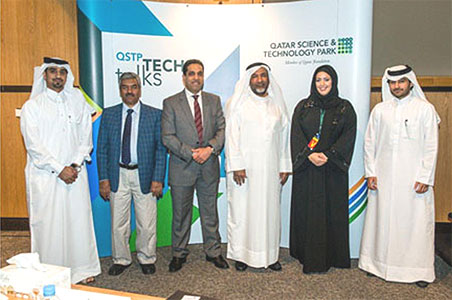DOHA: In the latest edition of its popular TECHtalks series, Qatar Science and Technology Park (QSTP) hosted Abdulsattar M Al Rasheed, CEO for RAF, Qatar Electricity and Water Company, to discuss water management and water security challenges facing Qatar and the Arabian Peninsula.
He was joined at the two-hour talk by a panel of experts, including Dr Adel Sharif, Research Director, Qatar Energy and Environment Research Institute, and Dr Mohamed Shamrukh Mahmoud, Expert in Water Resources, the Ministry of Environment.
Al Rasheed said Qatar faces a unique set of challenges with respect to water scarcity due to a shortage of reliable surface and fresh water sources.
qstp
QSTP officials with the speakers at the event.
According to Qatar’s inter-ministerial Permanent Population Committee, residents consume 675 litres of water per capita per day, about twice the average consumption in the European Union.
Given that Qatar’s population is expected to increase nearly eightfold by 2050, demand for water is likely to increase significantly. “The quality of life of future generations rests on how we manage key resources and what habits or mechanisms we implement today. Quality water is quickly becoming a scarce resource and unless we realise perils of inaction today, it may be too late to recover. Already the impact of water shortages has been felt in many parts of the world and technology development has a key role in reversing unsustainable trends,” Al Rasheed said.
Having served in the water and power industries for 32 years, Al Rasheed is a widely published author of power and desalination plant management topics. He is a member of the Bahrain-based Water Science and Technology Association and GCC CIGRI, a group of GCC engineers based in Saudi Arabia.
Industry specialists, researchers and students engaged the panel in a question-answer session on what the future holds for Qatar’s water shortage and the role of technology in addressing challenges.
Panellists agreed on a core set of recommendations to improve current conditions, stressing that the region as a pioneer in water security and innovation and solutions pave the way for further economic diversification and opportunity.

